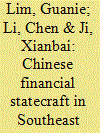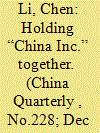|
|
|
Sort Order |
|
|
|
Items / Page
|
|
|
|
|
|
|
| Srl | Item |
| 1 |
ID:
185987


|
|
|
|
|
| Summary/Abstract |
Since 2013, the Belt and Road Initiative has become China’s signature foreign economic policy campaign. While there have been debates on the initiative’s implementation and implications, an emerging consensus suggests that the export of capital-intensive infrastructure is a key driving factor of China’s financial statecraft. For Southeast Asian countries, such Chinese efforts are useful in plugging their domestic infrastructure gaps, not least in the remote parts of their territory. Against this backdrop, this article examines arguably two of the most prominent Chinese infrastructure projects in Malaysia – the East Coast Rail Link (ECRL) and the Malaysia-China Kuantan Industrial Park (MCKIP). It posits three inter-related arguments. Firstly, unlike conventional analyses which commonly treat the Chinese state as a singular, unitary actor, both the central and provincial governments in China’s multi-layer state structure have played important roles and demonstrated different characteristics in Chinese infrastructure overture towards Malaysia. Secondly, one observes contrasting patterns of well-coordinated state-business relations in the ECRL project versus loose, decentralised state-business relations driven largely by Guangxi province and market forces for the MCKIP. Thirdly, the implementation of both the ECRL and the MCKIP has been heavily constrained by the political-institutional environment of Malaysia as the host country, illustrating that Chinese financial statecraft, in the form of infrastructure provision, generates considerably less impact than what popular rhetoric suggests.
|
|
|
|
|
|
|
|
|
|
|
|
|
|
|
|
| 2 |
ID:
108393


|
|
|
|
|
| Publication |
2011.
|
| Summary/Abstract |
Incorporating asymmetric cost and benefit of supplying excess liquidity into an otherwise standard time inconsistency model, this paper offers an explanation of the excess liquidity and housing price booms recently experienced in China. We find that the central bank's incentive to stimulate economic growth with excess liquidity fuels real estate prices and accelerates inflation bias. Therefore, the central bank should free itself from the pressure to achieve an economic growth rate higher than the potential level, and assign an appropriate weight to the real estate price fluctuations in the central bank's objective function, so that the central bank's policy of stimulating economic growth with excess liquidity can be constrained.
|
|
|
|
|
|
|
|
|
|
|
|
|
|
|
|
| 3 |
ID:
149743


|
|
|
|
|
| Summary/Abstract |
This article investigates the role of the Chinese Communist Party (CCP) in the rise of China's centrally controlled businesses (yangqi 央企), a batch of large business groups and financial institutions controlled by China's central party-state. It starts by comparing two competing policy approaches to defining the relations between the Party and state enterprise sector: the separation approach versus the adaptation approach. It then examines how the Party's “pro-big business” policies have shaped China's large enterprise reform since the 1960s and led to the formation of the yangqi. It also describes the key mechanisms used by the CCP to control the yangqi, including its personnel management system and disciplinary force. It further identifies and summarizes three key modes of the Party's intervention in the rise of the yangqi: institutional and policy entrepreneurship; leveraged personnel control; and residual mobilization capacity. The article concludes by discussing the future prospects for reforming the relations between the Party and big business in China.
|
|
|
|
|
|
|
|
|
|
|
|
|
|
|
|
| 4 |
ID:
173257


|
|
|
|
|
| Summary/Abstract |
Based on in-depth field research in an urban housing demolition and relocation project in J community, Jiangsu province, this article explores the strategies, mindset, and considerations employed by three levels of local authorities (the neighbourhood committee, the district and municipal governments) in resolving conflict with tough nail households. Such investigation highlights the combined discourse surrounding the ‘bargained authoritarianism’ concept and ‘accident avoidance’ principle in the context of ‘maintaining social stability’ (weiwen in Chinese) in China. The conclusion of this article adds to the interpretation of the perpetuating conflicting relationship between central and local in China. This article thus suggests that a shift in approach is required when local authorities establish legal procedures and regulations to manage increasing social conflict in China.
|
|
|
|
|
|
|
|
|
|
|
|
|
|
|
|
|
|
|
|
|